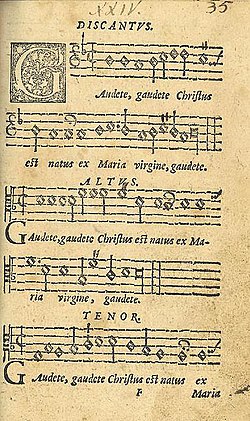1. Psallite unigenito by Michael Praetorius. Praetorius was a late 16th century German composer who was much loved by a music professor of mine. Said professor was also the director of the chamber choir with which I sang for three years, and every year at the holidays we would sing this beautiful, albeit short 4-part song:
Prætorius was also one of the most prolific composers of his generation in Germany, listing over forty volumes of printed music at the end of the Syntagma musicum, including sacred and secular works of all kinds for voices, choirs, instruments, and organ.
From Goldberg, the Early Music Portal, which I just discovered tonight! What a resource.

2. Gaudete (thanks, Barb!). This tune from the Renaissance is in a minor key and has such a rousing beat that it is fun to listen to--the recording I have that I like best is that of John Rutter and the Cambridge Singers on the cd, A Christmas Festival, but that's not available to listen to via an Amazon widget. There's a recording out there somewhere that I like better, but I haven't been able to find it--it uses period instruments and the small group of singers have excellent Latin. But for fun, listen to this recording by Steeleye Span, for the mangled Latin with the added bonus of Cockney accents!
3. O Magnum Mysterium, by Tomás Luis de Victoria. This motet did make the top 50 carols in BBC Music Magazine, coming in pretty high up the list at number fifteen. Victoria was another 16th century composer, this one from Spain. The beginning is gorgeously ethereal (if done correctly, and Chanticleer has one of the best recordings I could find), and the work ends with a rousing Alleluia.

